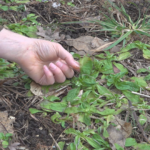
BURLINGTON, Vt. (WCAX) – Jeff Lubell grows enough produce in his home garden in Norwich to stock his fridge through half the year.
“All of my vegetables from May through the end of October come from my garden,” Lubell said.
Lubell has gardened for 16 years. He says he likes connecting with the earth and eating well. His garden took on more meaning during the pandemic. Growing food at home meant fewer trips to the grocery store – and lower risk of exposing his chronically ill daughter to COVID-19.
“I do try to minimize the number of trips so I appreciated it during the pandemic and frankly, even now I appreciate it,” Lubell reflected.
COVID wasn’t the only thing home gardening helped Vermonters evade. A new study shows producing food at home or finding it in the wild helped Vermonters avoid food insecurity during the pandemic.
U.S. food prices increased by approximately 11% from 2021 to 2022, according to the U.S. Government Accountability Office. Researchers from the Universities of Vermont and Maine set out to understand whether residents of the rural states were finding alternatives to the grocery store. They surveyed approximately 1,000 residents at the start of the pandemic, asking about home gardening, raising animals, hunting, foraging and food preservation. Their findings: nearly 60% of participants took part in these practices, with many experiencing less food insecurity 9 to 12 months later as a result.
“We’ve suspected that producing some of your own food in a garden or through hunting or fishing are good for people’s food security, but this is the best evidence that we have yet,” report co-author Sam Bliss explained.
Bliss says it’s a big step toward understanding how to help Vermonters experiencing food insecurity – about 1 in 11, according to Feeding America. But it’s also a lesson in who has the resources to grow or forage their own food. The survey found that chronically food insecure households face more barriers to land access and costs.
“What we need is policies and programs that help the folks who need it most access the knowledge, skills, land and equipment to produce some of their own food in their backyard,” Bliss said.
Experts recommend connecting with local gardening, hunting and foraging groups or tapping into state resources like 3SquaresVT to start your own food journey.
